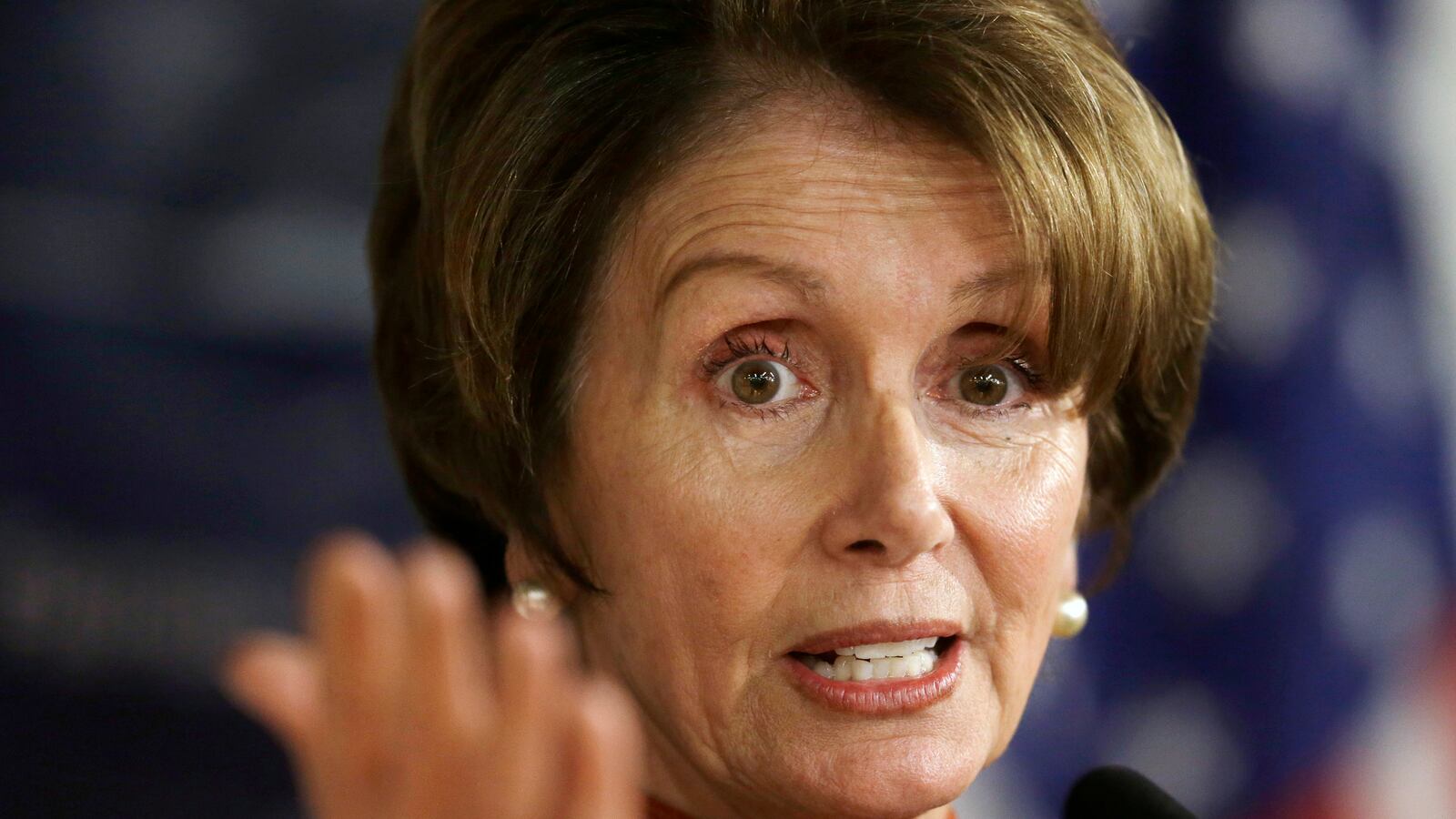President Obama is an old hand at absorbing attacks from his left flank. He got plenty of incoming hostility Wednesday during a conference call staged by a liberal advocacy group to highlight perceived flaws in his budget proposals.

But it’s a novel—and not altogether pleasurable—experience for House Democratic leader Nancy Pelosi to serve as target practice for the left.
Pelosi, the 13-term San Francisco congresswoman who was toppled from the House speakership during the Republican landslide of 2010, came in for harsh criticism from the Progressive Change Campaign Committee.
As two members of Pelosi’s caucus, Democratic Reps. Alan Grayson of Florida and Keith Ellison of Minnesota, listened mutely on the phone line, Adam Green, co-founder of the influential organization, lit into Pelosi for not publicly opposing the president’s proposal to tag Social Security benefits to “chained CPI,” a less generous method than the current system of calculating inflation in the Consumer Price Index and accompanying increases in monthly payments.
“The Democratic leader put out a statement [on Wednesday] where she failed to even mention chained CPI,” Green railed, and noted that in the past “she said she was quote-unquote ‘agnostic’ about chained CPI.” Citing New York Republican Rep. Chris Collins, who this week slammed Obama’s chained-CPI proposal as unfairly hurting seniors and veterans, Green went on: “What that means is Nancy Pelosi is now on the right of a Republican congressman.”
Green vowed that his group—which spent $2.5 million in the last election cycle, and on Tuesday delivered a petition to the White House signed by 2.3 million citizens decrying cuts to entitlements—will stage protests at the district offices of Pelosi, House Minority Whip Steny Hoyer of Maryland, and Wisconsin Democrat Rep. Ron Kind, the chairman of the centrist New Democrat Coalition, who has made positive noises about chained CPI.
Pelosi’s office declined to comment on Green’s full-throated blast. I asked Ellison and Grayson, who also raised alarms about Obama’s proposed cuts to Medicare and Medicaid benefits, if they shared his concerns about their leader. Ellison didn’t address my question, and Grayson offered a mild defense, arguing that Pelosi clearly opposes the president’s cuts “in private” and “off the record.”
“Congresswoman Pelosi has a 30-year record of defending Social Security and Medicare against cuts,” said Grayson, who won back his Orlando House seat in November after being swept away in 2010. “I know she’s made some statements that might be misinterpreted. But if you had private conversations with her, off the record, she would answer that she’s against cuts in Social Security and Medicare of any kind and in favor of expanding the program.”
Grayson argued that Pelosi’s leadership role regularly puts her in a delicate and awkward position with the Obama White House. “Sometimes she takes a position that’s undermined by the White House,” Grayson said. “She has to sometimes come to terms with the White House and not criticize it and at the same time function as the leader of a caucus of 200.”
Meanwhile, both Grayson and Ellison argued that Obama’s proposed cuts were bad policy and terrible politics, and several former Obama campaign workers who participated in the call described his budget—in the words of one volunteer—as a “hideous betrayal.”
“I feel terribly betrayed,” said a woman who identified herself as Susan, a 67-year-old campaign volunteer from Alexandria, Virginia, who knocked on doors for Obama in 2008 and 2012. “The president reneged on his promises ... This hideous betrayal haunts me.”
Ellison urged liberals not to “waste your time worrying about Obama ... [but] put all your time and energy into defeating this thing.” He likened the president’s proposals, and other, more draconian cuts proposed by the House-passed budget formulated by Republican Budget Committee chairman Paul Ryan, as an effort “to take apart everything that helps make American lives better ... and to shrink government to the size where you can drown it in the bathtub ... Why is Obama being a party to it? I don’t know. I don’t even care.”
Grayson, for his part, compared aspects of Obama’s budget proposal and the Republican proposal to giving Americans “a choice between Diet Coke and Coke Zero.” He rejected the notion that Obama, by embracing certain GOP-supported policy ideas, is making himself more politically palatable to the nation at large by positioning himself as a centrist. He also denied that attacks from the left serve only to help the president appear more reasonable.
“This isn’t some kind of Sister Souljah moment,” Grayson said, referring to Bill Clinton’s famous reprimand of a racist African-American rap performer, before an audience recruited by the Rev. Jesse Jackson, during the 1992 presidential campaign. “It’s one thing for a president to criticize a black performer and make it sound like he’s appealing to moderates. It’s quite another thing for a president to attack programs that have really been the foundation of what it means to be American for the last three quarters of a century.”






